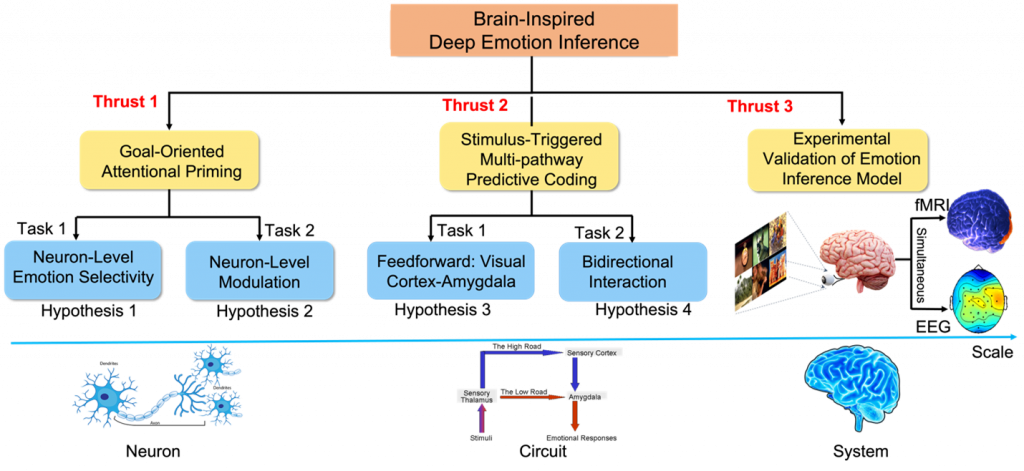Dr. Ruogu Fang and collaborators have secured a significant National Science Foundation grant for their project, “NCS-FO: Brain-Inspired Goal-Oriented and Bidirectional Deep Emotion Inference.” This pioneering initiative at the intersection of neuroscience and AI will explore groundbreaking advancements in both fields by building neuroscience-informed, brain-inspired AI systems to sense emotion as the human brain does.

The NCS-FO project led by Drs. Fang (PI), Mingzhou Ding (Co-PI), and Andreas Keil (Co-PI) marks a transformative plan to step forward in neuroscience and AI. Infusing brain-inspired innovations into deep learning aims to revolutionize our understanding of emotions and AI models grounded in neuroscience principles. This initiative promotes diversity and equips the next generation of researchers to explore the exciting frontiers of AI and neuroscience.
The core objective of the NCS-FO project is to develop a brain-inspired, goal-oriented, and bidirectional deep learning model for emotion inference. Human emotions, complex responses to life’s challenges, and opportunities are products of intricate network interactions within the brain. Dysregulation in these networks underlies mental disorders like anxiety and depression.
Researchers use natural images while recording brain activity via EEG and fMRI to explore the neural basis of emotion inference. Despite years of research, we still lack a comprehensive understanding of how emotions are recognized in natural scenes. Traditional neuroscience faces limitations in causally manipulating neural systems and testing outcomes with human imaging data. Deep Neural Networks (DNNs) offer a solution by simulating neural processes cost-effectively.
The NCS-FO project introduces two brain-inspired innovations into DNN architecture. These innovations, incorporating top-down modulation and reciprocal interactions, enhance deep learning’s capability to model emotions and bridge AI with neuroscience. This approach enables researchers to test model predictions against neuroimaging data, providing valuable insights into emotional mechanisms.
Beyond research, the NCS-FO project initiates a “Neuroscience × AI” movement, fostering interdisciplinary collaboration. It integrates AI and neuroscience into education, research, and outreach. This initiative contributes to a diverse, well-trained workforce, engaging minority and female students in AI x Neuroscience research, breaking stereotypes about AI, and highlighting its potential to advance brain research.
Researchers:
- Principal Investigator (PI): Ruogu Fang, Ph.D., Associate Professor & J. Crayton Pruitt Family Term Fellow, Department of Biomedical Engineering, University of Florida
- Co-PI: Mingzhou Ding, Ph.D., Distinguished Professor & J. Crayton Pruitt Family Professor, Department of Biomedical Engineering, University of Florida
- Co-PI: Andreas Keil, Ph.D., Distinguished Professor, Department of Psychology, University of Florida
Originally published by J. Crayton Pruitt Family Department of Biomedical Engineering.
